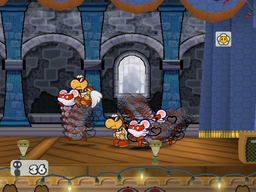Tease: Difference between revisions
Annalisa10 (talk | contribs) |
Annalisa10 (talk | contribs) |
||
| Line 25: | Line 25: | ||
|SpaEM=Confusion | |SpaEM=Confusion | ||
|Fre=Chassé croisé | |Fre=Chassé croisé | ||
|FreM=Comings and goings | |FreM=Comings and goings, an expression usually used to describe a situation of two people looking for each other without meeting | ||
}} | }} | ||
Revision as of 09:21, October 15, 2023
| Paper Mario: The Thousand-Year Door move | |
|---|---|
| Tease | |

| |
| Mastered by | Ms. Mowz |
| Rank | Super Rank |
| FP cost | 3 |
| Effect | Ms. Mowz attempts to daze all enemies |
| Target | All enemies |
| Action Command Tier | NICE |
Tease is a move that can be performed by Ms. Mowz in Paper Mario: The Thousand-Year Door at the cost 3 FP upon reaching Super Rank. It involves Ms. Mowz and three clones of herself jumping around, attempting to daze the enemies based on the individual enemies' resistance and the Action Command success. To execute the Action Command the player must hold ![]() to fill up the gauge, but if it overfills, it will begin to empty out of control. If at the end of the timer, the gauge is filled past two thirds, the odds of inflicting the status will equal to the enemy' susceptibility, and if the gauge is filled for less than two thirds the chance of inflicting dizziness will be decreased.
to fill up the gauge, but if it overfills, it will begin to empty out of control. If at the end of the timer, the gauge is filled past two thirds, the odds of inflicting the status will equal to the enemy' susceptibility, and if the gauge is filled for less than two thirds the chance of inflicting dizziness will be decreased.
The player can input ![]() as Ms. Mowz lands a backflips after finishing the move to perform a Stylish move. Furthermore in the Japanese version, the stylish has a increased Star Power modifier.
as Ms. Mowz lands a backflips after finishing the move to perform a Stylish move. Furthermore in the Japanese version, the stylish has a increased Star Power modifier.
Names in other languages
| Language | Name | Meaning |
|---|---|---|
| Japanese | まどわせ~る Madowase~ru |
From「まどわせる」(madowaseru, to trick). The symbol ~ denotes a playful attitude and emphasis and is common place, particularly in entertainment media (e.g. manga, video games and anime). |
| French | Chassé croisé |
Comings and goings, an expression usually used to describe a situation of two people looking for each other without meeting |
| German | Schwindling |
From "schwindlig" meaning dizzy and the suffix -ling. |
| Italian | SqUiTsQUit |
"Squeak Squeak" written in alternate caps to indicate dizziness. |
| Spanish (NOE) | Confusión[1] |
Confusion |